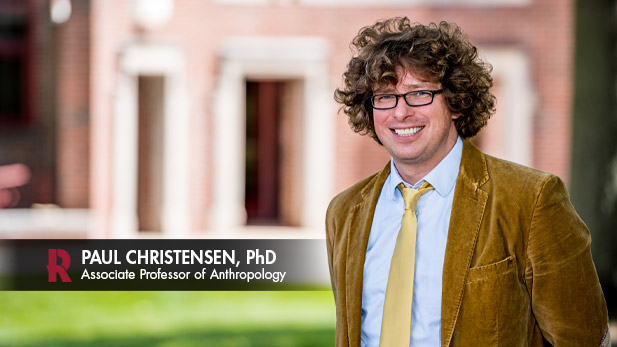Rose-Hulman Professor Paul Christensen Publishes Two Peer-Reviewed Articles This Summer
Friday, September 19, 2025

Associate Professor of Anthropology Paul Christensen, PhD, shares his expertise through two peer-reviewed research articles published this summer.
As the 2025-2026 academic year begins, Paul Christensen, PhD, is sharing his expertise with an audience beyond his campus classrooms. The associate professor of anthropology in the Department of Humanities, Social Sciences, and The Arts celebrated a significant milestone, publishing two peer-reviewed research articles this summer.
"My two recent articles argue for critical scrutiny around the inconsistencies between what Tokyo's influential individuals and institutions claim they are doing, and what ethnographic engagement reflects," Christensen explained. "Across both pieces, a tendency to make sweeping and laudable claims by officials is shown to be broadly illusory, as little substantive positive change is enacted or even meaningfully pursued."
Christensen's article "The Fictitious Shine of Japan's Future" was published in the June edition of Asia-Pacific Journal: Japan Focus. Christensen critiques Tokyo Governor Koike Yuriko's "vision of a city where everyone can shine" and argues that the policies mask systemic contradictions and inequities. Christensen utilizes ethnographic insights to highlight the cultivation of meaningful alternatives that emphasize empathetic dignity in Japan's capital.
Published in the summer 2025 edition of Social Science Japan Journal, Christensen's second article, "Selective Development Goals: Examining Japan's SDG Implementation Gaps" examines three specific components of the United Nations' Sustainable Development Goals (SDGs): no poverty, zero hunger, and gender equality. Christensen and his co-authors argue that the SDGs are "used by the Japanese government as an instrument of techno-political effect to obscure root causes of persistent social issues."
Christensen teaches anthropology courses at Rose-Hulman, specializing in contemporary Japan, and co-advises UNITY, Rose-Hulman's Gay-Straight Alliance organization for all students. Christensen's research interests include the use of psychoactive substances and recovery from addiction, and his book, "Alcoholism, Masculinity, and Japan: Suffering Sobriety in Tokyo" was published in late 2014. Christensen has been invited to make presentations at Harvard University, the University of Missouri at St. Louis, the University of Hawai‘i at Mānoa, and the University of Michigan.
Christensen was selected as a Fulbright Faculty Scholar, the United States government's flagship international exchange program, and spent the time during the 2021-2022 academic year in Japan. He completed fieldwork for a project titled "Diverging Tokyo: Poverty, Revitalization, and the Shaping of a Meaningful Existence Project Narrative."
"My two recent articles argue for critical scrutiny around the inconsistencies between what Tokyo's influential individuals and institutions claim they are doing, and what ethnographic engagement reflects," Christensen explained. "Across both pieces, a tendency to make sweeping and laudable claims by officials is shown to be broadly illusory, as little substantive positive change is enacted or even meaningfully pursued."
Christensen's article "The Fictitious Shine of Japan's Future" was published in the June edition of Asia-Pacific Journal: Japan Focus. Christensen critiques Tokyo Governor Koike Yuriko's "vision of a city where everyone can shine" and argues that the policies mask systemic contradictions and inequities. Christensen utilizes ethnographic insights to highlight the cultivation of meaningful alternatives that emphasize empathetic dignity in Japan's capital.
Published in the summer 2025 edition of Social Science Japan Journal, Christensen's second article, "Selective Development Goals: Examining Japan's SDG Implementation Gaps" examines three specific components of the United Nations' Sustainable Development Goals (SDGs): no poverty, zero hunger, and gender equality. Christensen and his co-authors argue that the SDGs are "used by the Japanese government as an instrument of techno-political effect to obscure root causes of persistent social issues."
Christensen teaches anthropology courses at Rose-Hulman, specializing in contemporary Japan, and co-advises UNITY, Rose-Hulman's Gay-Straight Alliance organization for all students. Christensen's research interests include the use of psychoactive substances and recovery from addiction, and his book, "Alcoholism, Masculinity, and Japan: Suffering Sobriety in Tokyo" was published in late 2014. Christensen has been invited to make presentations at Harvard University, the University of Missouri at St. Louis, the University of Hawai‘i at Mānoa, and the University of Michigan.
Christensen was selected as a Fulbright Faculty Scholar, the United States government's flagship international exchange program, and spent the time during the 2021-2022 academic year in Japan. He completed fieldwork for a project titled "Diverging Tokyo: Poverty, Revitalization, and the Shaping of a Meaningful Existence Project Narrative."